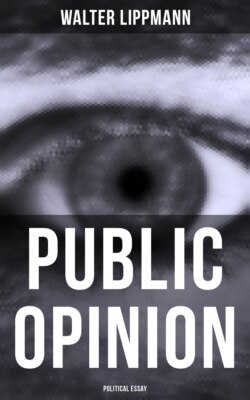Читать книгу Public Opinion: Political Essay - Walter Lippmann - Страница 30
На сайте Литреса книга снята с продажи.
6
ОглавлениеThus the environment with which our public opinions deal is refracted in many ways, by censorship and privacy at the source, by physical and social barriers at the other end, by scanty attention, by the poverty of language, by distraction, by unconscious constellations of feeling, by wear and tear, violence, monotony. These limitations upon our access to that environment combine with the obscurity and complexity of the facts themselves to thwart clearness and justice of perception, to substitute misleading fictions for workable ideas, and to deprive us of adequate checks upon those who consciously strive to mislead.
30. Phillip's Code.
31. Cited by White, Mechanisms of Character Formation.
32. Special Cable to The New York Times, May 25, 1921, by Edwin L, James.
33. In May of 1921, relations between England and France were strained by the insurrection of M. Korfanty in Upper Silesia. The London Correspondence of the Manchester Guardian (May 20, 1921), contained the following item:
"The Franco-English Exchange in Words.
"In quarters well acquainted with French ways and character I find a tendency to think that undue sensibility has been shown by our press and public opinion in the lively and at times intemperate language of the French press through the present crisis. The point was put to me by a well-informed neutral observer in the following manner.
"Words, like money, are tokens of value. They represent meaning, therefore, and just as money, their representative value goes up and down. The French word 'etonnant' was used by Bossuet with a terrible weight of meaning which it has lost to-day. A similar thing can be observed with the English word 'awful.' Some nations constitutionally tend to understate, others to overstate. What the British Tommy called an unhealthy place could only be described by an Italian soldier by means of a rich vocabulary aided with an exuberant mimicry. Nations that understate keep their word-currency sound. Nations that overstate suffer from inflation in their language.
"Expressions such as 'a distinguished scholar,' 'a clever writer,' must be translated into French as 'a great savant,' 'an exquisite master.' It is a mere matter of exchange, just as in France one pound pays 46 francs, and yet one knows that that does not increase its value at home. Englishmen reading the French press should endeavour to work out a mental operation similar to that of the banker who puts back francs into pounds, and not forget in so doing that while in normal times the change was 25 it is now 46 on account of the war. For there is a war fluctuation on word exchanges as well as on money exchanges.
"The argument, one hopes, works both ways, and Frenchmen do not fail to realize that there is as much value behind English reticence as behind their own exuberance of expression."
34. The New Republic: December 29, 1920, p. 142.
35. Internat. Zeitschr, f. Arztl. Psychoanalyse, 1913. Translated and republished by Dr. Ernest Jones in S. Ferenczi, Contributions to Psychoanalysis, Ch. VIII, Stages in the Development of the Sense of Reality.
36. Ferenczi, being a pathologist, does not describe this maturer period where experience is organized as equations, the phase of realism on the basis of science.
37. See, for example, Diagnostische Assoziation Studien, conducted at the Psychiatric University Clinic in Zurich under the direction of Dr. C. G. Jung. These tests were carried on principally under the so-called Krapelin-Aschaffenburg classification. They show reaction time, classify response to the stimulant word as inner, outer, and clang, show separate results for the first and second hundred words, for reaction time and reaction quality when the subject is distracted by holding an idea in mind, or when he replies while beating time with a metronome. Some of the results are summarized in Jung, Analytical Psychology, Ch. II, transl. by Dr. Constance E. Long.
38. Jung, Clark Lectures.
